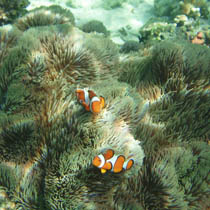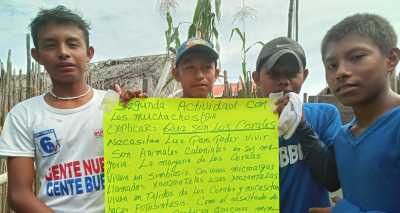
- Lighthouse Foundation
- Projects
- Panama: Guna Yala, at sea level
Panama: Guna Yala, at sea level
What is at issue:
Guna Yala, the land of the Guna, is a semi-autonomous region in the north of Panama on the Caribbean coast. Since the revolution in 1925, the Guna have owned their land and the exclusive right to use natural resources. Its diverse, centuries-old indigenous culture is today subject to many influences.
"Our approach is to educate people so they can understand the issues and work towards improving resource management and helping communities sustainably use the natural resources."
Since 2004, the Fundación BALU UALA and several municipalities in the autonomous region of Guna Yala on the Caribbean coast of Panama have been working together on this project. The pillars of the project at Wargandup, Digir, Niadup, Uggubseni and Dad NaggweDubbir are environmental education, marine protected areas (MPA), sustainable agriculture and waste management.
For the implementation, special commissions have been formed and trained by the municipalities. The main function of these commissions, which are supported by an environmental educator, is to control and promote marine protected areas, the provision of environmental education on relevant topics in the respective communities, the promotion of waste management (eg. through training and clean-up actions), the support of sustainable fisheries under the rules of the self-government Congreso General Guna (CGG) and promoting sustainable local food production.
What's happening now:
We have assessed our recent work, taking into account our strengths and weaknesses, our opportunities and the risks we face as an organisation, and used them to strategically plan for the future. We discussed this in September 2024 with project promoters from Guebdi, Digir, Niadup, Uggubseni and Dad Naggwe Dubbir, four members of MPAs and agricultural commissions, ten young people from Dad Naggwe Dubbir and other project coordinators.
Balu Uala aims to be a force for community education and leadership training for the rational use and management of Nabgwana (nature) based on the Guna worldview and scientific knowledge to create and strengthen community resilience and resistance in the face of a system that threatens life.
Our goals are:
- Reactivation of MPAs and their commissions
- Monitoring the state of local reefs and other marine ecosystems
- Establishment or reactivation of model agricultural plots
- Solid waste management
- Preservation of traditional varieties of food and medicinal plants and exchange of seeds
- Creating the conditions for a marine research and education centre (acceptance, use)
- Inclusion of a new topic in our work: promoting knowledge of traditional knowledge, especially among young people, with the help of traditional authorities (saila, argar, inadule, etc.)
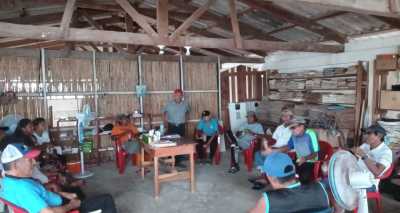
What we have achieved:
2019 - 2024
Our study on public perception of climate change in cooperation with the Faculty of Sociology at the University of Panama has formed the basis for information and awareness-raising campaigns since 2023.
In 2022, the Isbergungalu cooperative supported by Balu Uala successfully completed all the necessary steps to become a fully recognised and operational cooperative.
In response to our calls for real and urgent climate action, the University of Panama declared a ‘climate emergency’ in 2022 and committed to include climate education in the curricula of all faculties and degree programmes and to contribute to climate solutions through its research to the best of its ability.
The schools regularly invite the project staff (promoters) to give lectures on environmental topics or to help organise activities. The local office of the Ministry of Agriculture (MIDA) also works very actively with the local BALU UALA groups, as these are now among the most important farmers' groups in the region. ARAP, the Marine Resources Authority, also receives our support when they carry out their activities.
In Dad Naggwe Dubbir, Uggubseni, Niadup, Digir and Uargandup, the teams have given lectures and video presentations in local schools, organized art activities such as painting, painting or processing garbage into art objects. They also collected rubbish on local beaches, snorkeled at MPAs, gave lectures for various organized groups such as sports clubs, women's groups, and gave lectures at local meeting houses.
The MPAs promoted by BALU UALA have now been taken over by the municipalities and have been anchored in their local regulations. Recently, at a meeting of the Congreso General Guna, in which all 48 communities of Guna Yala participated, several leaders pointed out the importance of the existing MPAs and the need to establish further protected areas in each community.
2008 - 2018
- In each island community, one or two project members and members of the MPA commissions are now implementing the education program. The educational program has since been extended to a total of 13 island communities.
- The fisheries inspectors elected by the municipalities supervise the fishery-related regulations. The monitoring of marine protected areas is now common practice of community work.
- In 2010, a total of nine Marine Protected Areas have been set up so far.
- The General Guna Congress stopped the good cooperation in 2009 after several conflicts. However, it has accelerated the adoption of the idea of a sustainable use of marine resources as an important project objective.
- MPA commissions take over agricultural tasks on the mainland and pick up the topic of waste and garbage. Overall, the role of commissions in the communities is becoming stronger and more autonomous.
- Formation of a cooperative for the education of organic agriculture.
- The coral reef monitoring shows a relatively intact situation of the corals and in some areas overfishing.
- Event of the first "Festival del Mar" since 2005.
- Marine reserves are respected in all communities, lobster fisheries have declined as a result of other sources of income.
- New focus: pollution from waste and the removal of sand and corals for construction.
- By the end of 2018, all papers have been approved and the official document recognizing the cooperative Isbergun Galu as such is available.
2004 - 2007
- First educational workshops on marine biology and ecology, conservation, coral biology and environmental education in six, later twelve Guna Yala communities.
- In each community at least one volunteer was found and trained as project representative.
- Special teaching materials, videos, leaflets or posters are developed by Balu Uala
- Establishing a basic fisheries monitoring program with data collection on number of species, biomass, sex, fishing effort, fishing grounds, own use or export etc.
- The fishermen in twelve communities were registered and the current fishing practice was reviewed. Every community now has a fisheries inspector who records daily catch, inspects catches and confiscates illegal catches like lobsters that are too small or shiny.
- Six communities set up Marine Protected Areas (MPA). An MPA commission of 8 to 15 members takes control and is an effective instrument for the coral reef management.
- Due to the protected areas the number of lobsters, young snapper and gilthead bream increases. Thus, the municipalities interest in participating the project clearly increases
Guna Yala - Back to Land
There has been talk for many years, more than a decade actually, of crossing to land, to escape from the challenges posed by the demographic growth and unsuitability of the islands for the current population level.
A chance for a new beginning at a critical time?
Reports:
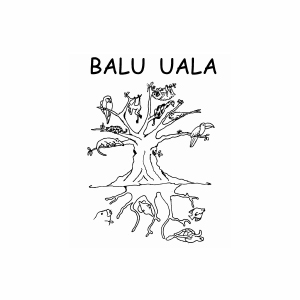
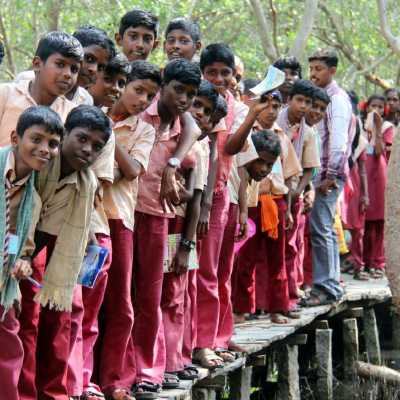)
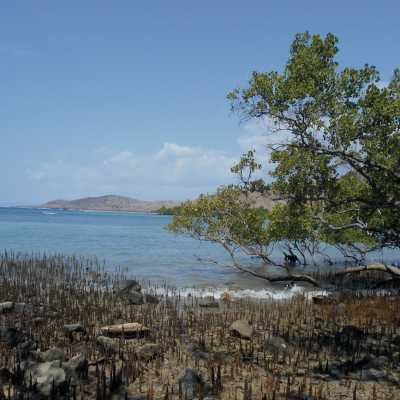)
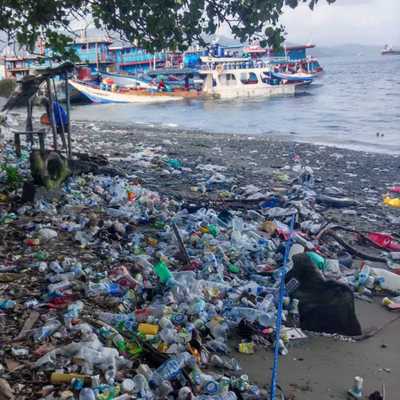)
